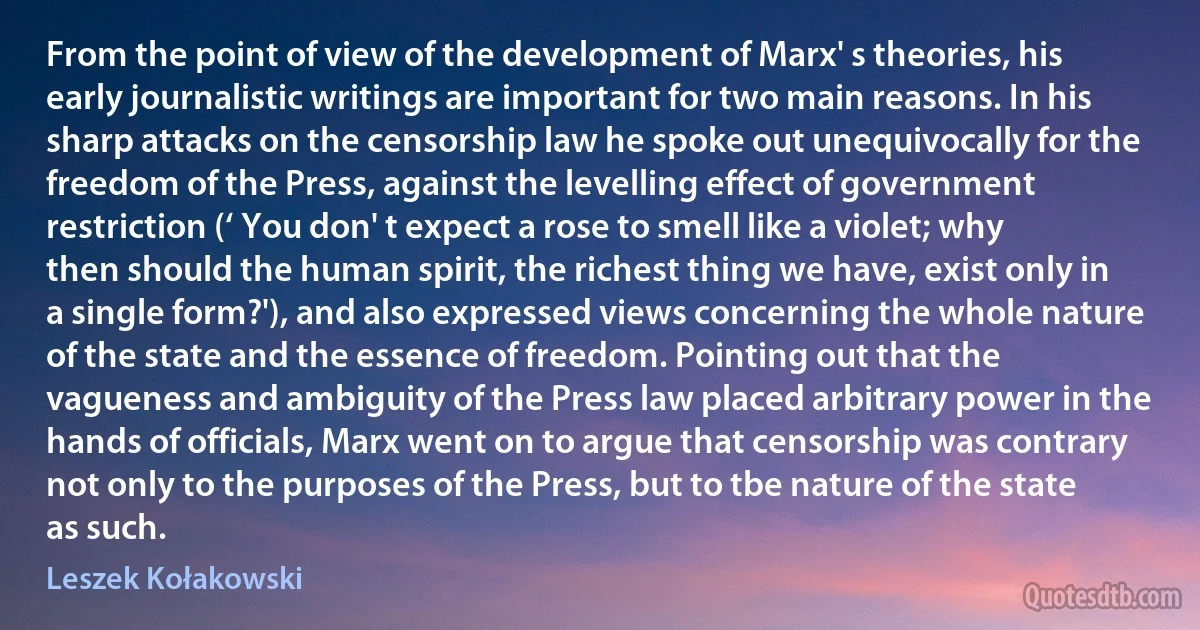
From the point of view of the development of Marx' s theories, his early journalistic writings are important for two main reasons. In his sharp attacks on the censorship law he spoke out unequivocally for the freedom of the Press, against the levelling effect of government restriction (‘ You don' t expect a rose to smell like a violet; why then should the human spirit, the richest thing we have, exist only in a single form?'), and also expressed views concerning the whole nature of the state and the essence of freedom. Pointing out that the vagueness and ambiguity of the Press law placed arbitrary power in the hands of officials, Marx went on to argue that censorship was contrary not only to the purposes of the Press, but to tbe nature of the state as such.
Leszek KołakowskiRelated topics
ambiguity arbitrary censorship development early expect form freedom went government human law levelling nature point power restriction rose should sharp single smell spoke spirit state thing vagueness view violet marx handsRelated quotes
Now I'm sitting quietly at home again and I'm happy to be able to work undisturbed. I made a lot of sketches of life in Germany and it was very intriguing to see life there [in Berlin, a stay for three weeks]. I was also glad to see the old pictures of Rembrandt, Dürer, etc. again and to have the confirmation and encouragement they gave me. As for the moderns, I saw damned little that gripped me... Modern German painting has moved so far away from me and become unintelligible in areas in which my work had, and still has, an influence; but people like Klee, Kandinsky, etc. have moved much closer to me again, in fact I value the Bauhaus more and more. These people are working and developing. You can see that there is development. And they love their work, which is the main thing.

Ernst Ludwig Kirchner
For what advantage is it, that the world enjoys profound peace, if thou art at war with thyself? This then is the peace we should keep. If we have it, nothing from without will be able to harm us. And to this end the public peace contributes no little: whence it is said, ‘That we may lead a quiet and peaceable life.' But if any one is disturbed when there is quiet, he is a miserable creature. Seest thou that He speaks of this peace which I call the third (inner, ed.) kind? Therefore when he has said, ‘that we may lead a quiet and peaceable life,' he does not stop there, but adds ‘in all godliness and honesty.' But we cannot live in godliness and honesty, unless that peace be established. For when curious reasonings disturb our faith, what peace is there? or when spirits of uncleanness, what peace is there?

John Chrysostom
The origin of this research was an attempt to extend Cassel's system of equations of price determination in one market to that of several trading countries. Although the point of departure is totally different, the results of that attempt (presented in chapter III) exhibit important similarities to Heckscher's treatment in ‘‘The Effect of Foreign Trade on the Distribution of Income,'' published one year earlier in Ekonomisk Tidskrift, 1920. There is no doubt that the author was unconsciously influenced by Heckscher's paper both at this and at later stages of the work. The influence of this pathbreaking paper, both conscious and unconscious, has surely been particularly decisive in the development of the material in chapters I–III.

Bertil Ohlin
Let us tenderly and kindly cherish, therefore, the means of knowledge. Let us dare to read, think, speak, and write. Let every order and degree among the people rouse their attention and animate their resolution. Let them all become attentive to the grounds and principles of government, ecclesiastical and civil. Let us study the law of nature; search into the spirit of the British constitution; read the histories of ancient ages; contemplate the great examples of Greece and Rome; set before us the conduct of our own British ancestors, who have defended for us the inherent rights of mankind against foreign and domestic tyrants and usurpers, against arbitrary kings and cruel priests, in short, against the gates of earth and hell.

John Adams
What I have felt at McLaren is good professionalism, a team that is very determined and focused on the championship. There is a new atmosphere within the team, and I saw that when I went to the factory and met all the people. They are so excited. They really think that after a few years without success, this is the year to come back. No-one has doubts. That was a complete surprise to me, yet from my point of view, it was great to see all that optimism, and I feel more ambitious now - a completely new man. Sometimes after a tough season and when the winter arrives, you want to test as late as possible, to be on your holidays as much as you can. But now it's the opposite. I want to be in the car. I feel like when I arrived in Formula One six years ago. I just want to drive.

Fernando Alonso
